- Courses
- GS Full Course 1 Year
- GS Full Course 2 Year
- GS Full Course 3 Year
- GS Full Course Till Selection
- Answer Alpha: Mains 2025 Mentorship
- MEP (Mains Enrichment Programme) Data, Facts
- Essay Target – 150+ Marks
- Online Program
- GS Recorded Course
- Polity
- Geography
- Economy
- Ancient, Medieval and Art & Culture AMAC
- Modern India, Post Independence & World History
- Environment
- Governance
- Science & Technology
- International Relations and Internal Security
- Disaster Management
- Ethics
- NCERT Current Affairs
- Indian Society and Social Issue
- NCERT- Science and Technology
- NCERT - Geography
- NCERT - Ancient History
- NCERT- World History
- NCERT Modern History
- CSAT
- 5 LAYERED ARJUNA Mentorship
- Public Administration Optional
- ABOUT US
- OUR TOPPERS
- TEST SERIES
- FREE STUDY MATERIAL
- VIDEOS
- CONTACT US
BIOSPHERE RESERVES
BIOSPHERE RESERVES
04-11-2023
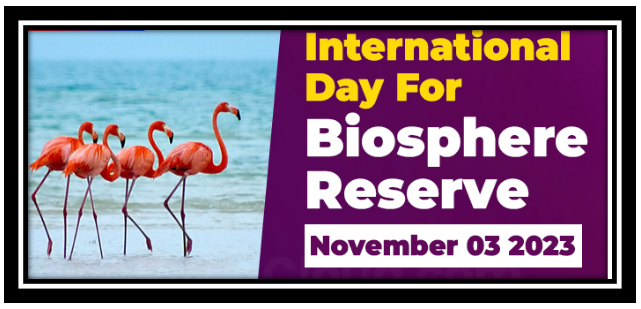
.
Context
On 3 November, 2023 the second anniversary of International Biosphere Reserve Day, celebrated.
More in News
- In this context, the United Nations Educational, Scientific and Cultural Organization (UNESCO) partnered with the Ministry of Environment, Forests and Climate Change and the National Centre for Sustainable Coastal Management, concluded the 10th South and Central Asian Biosphere Reserve Network Meeting (SACAM) in Chennai, India.
- The SACAM event, themed "Ridge to Reef," facilitated collaboration on sustainable environmental practices in South and Central Asia.
Biosphere Reserves
- Biosphere reserves are areas, designated by UNESCO under the Man and the Biosphere (MAB) Programme which was launched in 1971, to promote the conservation of biodiversity, sustainable development, and scientific research
-
They consist of three zones: -

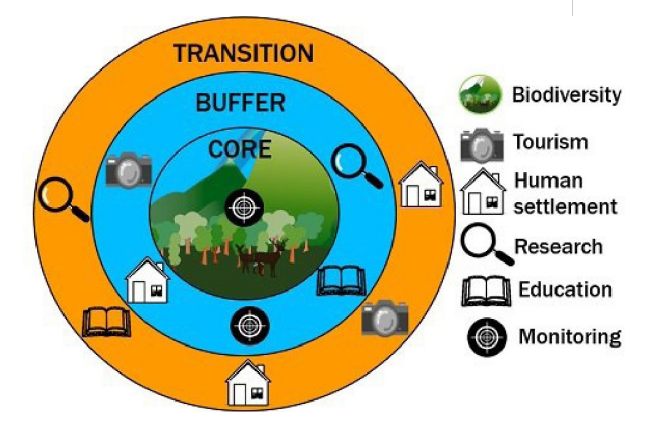
- The MAB Programme aims to improve the relationship between people and their environment and to foster the integration of natural and social sciences.
- The MAB Programme also supports the implementation of the 2030 Agenda for Sustainable Development and the post-2020 global biodiversity framework.
- The Aim of Biosphere Reserves try to balance economic and social development and maintenance of associated cultural values along with the preservation of nature.
- Biosphere reserves are part of the World Network of Biosphere Reserves (WNBR), which currently comprises 748 sites in 134 countries, including 22 transboundary sites.
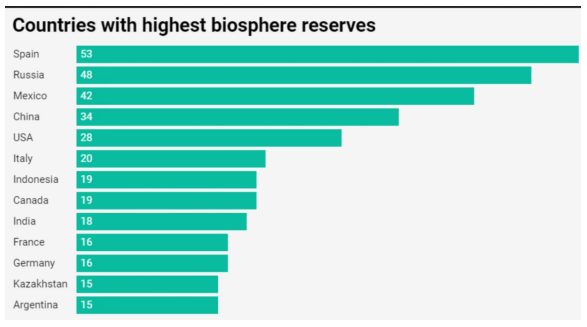
Status of Biosphere Reserves in India
- There are 748 reserves in 134 countries, including 22 trans-boundary sites.
- India has 18 internationally recognized Biosphere reserves, with the Nilgiri reserve being the first.
- The latest addition is Panna in Madhya Pradesh.
- Twelve of the eighteen biosphere reserves are a part of the World Network of Biosphere Reserves, based on the UNESCO Man and the Biosphere (MAB) Programme list.
Biosphere In India
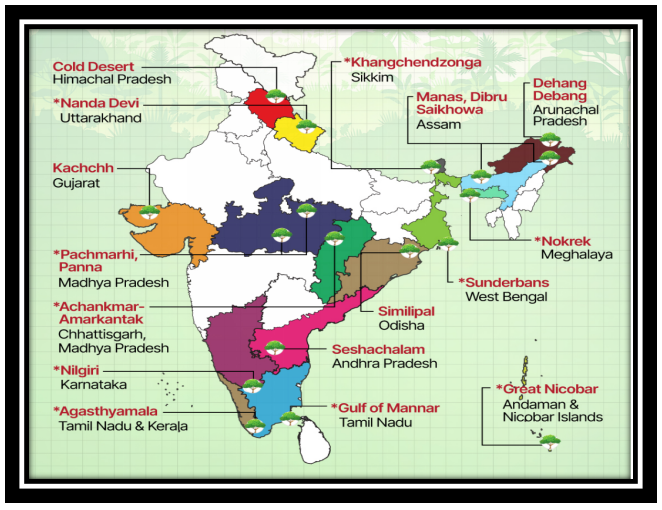
Difference between Wildlife Sanctuary, National Park and Biosphere Reserve
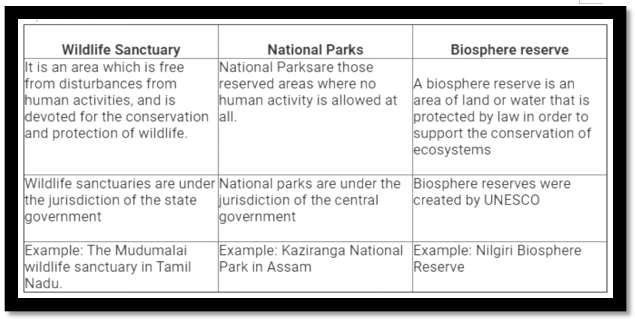
Challenges for Biosphere Reserves
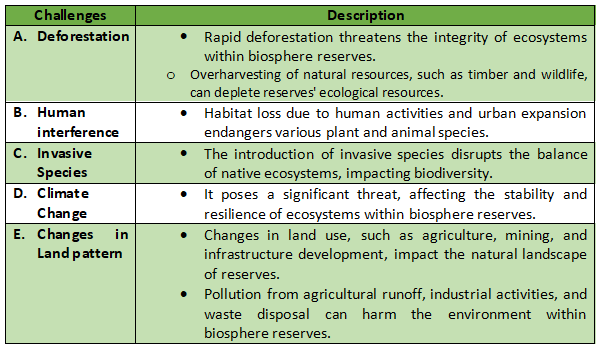
Global initiatives
- World Network of Biosphere Reserves: UNESCO’s World Network of Biosphere Reserves connects and supports designated sites globally, fostering collaboration in biodiversity conservation and sustainable development.
- International Cooperation: Biosphere Reserves of ten involve collaboration between neighbouring countries, enhancing international cooperation for conservation efforts. E.g., Khangchendzonga Biosphere Reserve
- Sustainable Development Goals (SDGs): The United Nations’ SDGs, particularly Goal 15 (Life on Land) and Goal 14 (Life Below Water), emphasize the importance of conserving biodiversity and sustainable management of ecosystems, aligning with biosphere reserve objectives.
Way Forward
-
Strengthening Local Initiatives:
- Encouraging and supporting local communities to take an active role in managing and protecting these vital ecosystems is a critical way forward.
- The successes of local community-driven conservation efforts, such as those in the Sundarban Biosphere Reserve and the Gulf of Mannar Biosphere Reserve, should be highlighted.
-
Empowering Sustainable Practices:
- Promote sustainable practices within biosphere reserves, emphasizing eco-friendly tourism and community involvement.
- Encourage sustainable agriculture, responsible resource management, and waste reduction measures to minimize the ecological footprint.
-
Climate Resilience and Adaptation:
- Establish climate-resilient strategies within biosphere reserves, including measures to combat the impacts of climate change.
- Develop adaptation plans to safeguard ecosystems and reduce vulnerabilities to changing weather patterns.
-
Resource Allocation and Funding:
- Advocate for increased financial and technical support for biosphere reserves, enabling them to fulfil their conservation and management goals.



